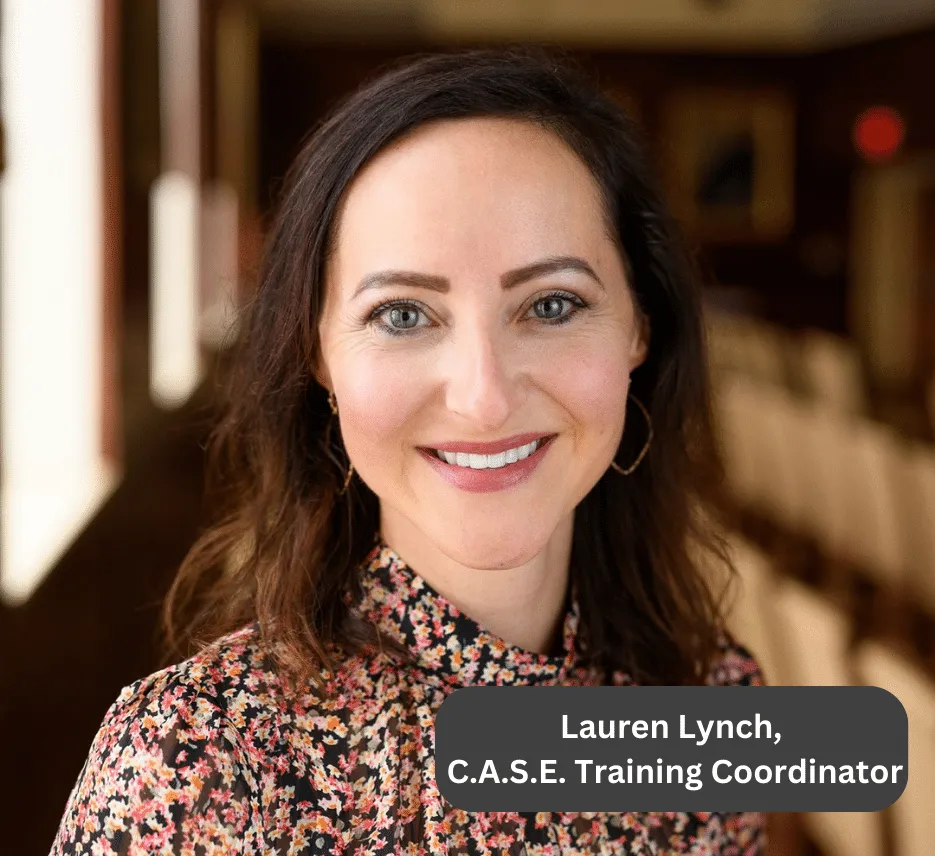Educational Training Services

Let C.A.S.E. Address Your Training Needs
C.A.S.E. has a 25-year history of experience and expertise in addressing the mental health needs of children and youth and their foster, adoptive and kinship families. Using this extensive knowledge base, we have developed a wide variety of training resources to enhance the adoption competency of the child welfare and mental health workforce.
Whether you are training parent groups or professionals, we have curriculum, training, and implementation specialists, including those with lived adoption experience, to support your organizations’ training needs.
View Educational Training Topics
We Provide Experiential Trainings
C.A.S.E. brings world-class expertise directly to your staff or parent group with C.A.S.E. educational training services. We offer both in-person and online instructional formats with a broad range of high-impact session topics that can be customized to meet your specific audience needs.
Whether you’re looking for key learning to support adoptive parents, resource and kinship groups, child welfare and mental health professionals, or a combination of parents and professionals, we have the educational training resources to meet you where you are and take you where you want to go.
C.A.S.E. Educational Training Sessions are:
- Approximately 90-120 minutes long, including time for Q&A.
- Customizable with additional content for greater topic depth or breadth.
- Presented either in-person or online using the Zoom virtual meeting platform or other platform of your choice.
- Led by experienced professionals trained in adoption competency who have varied lived experience. Presenters may be C.A.S.E. staff or consultants.
For more information on educational training session topics, fees, and availability, please submit an Interest Form:
Educational Training Session Topics
Gain a valuable new perspective by looking at adoption through the eyes of a child. Details gathered through in-depth research and years of experience shed light on what children feel, think, and comprehend about adoption as they progress from pre-school years through adolescence. This session covers common questions, fears and concerns children have related to birth parents, relationships with adoptive and extended family members and relationships with peers. It also addresses how children who are not adopted perceive and are impacted by the adoption process. Additionally, participants will learn methods for addressing ambiguous loss and grief as well as handling self-esteem and self-value through an adoption-competent developmental lens.
This training session gives foster and adoptive parents practical techniques and reassuring advice to help promote secure attachment with their children. Participants will learn about different attachment styles, how attachment develops and the life experiences, including neurobiological influences, that interrupt secure attachment. The session also covers sensory-related activities that promote emotional regulation and healthy parent-child connections.
Based on the book, Beneath the Mask: Understanding Adopted Teens, by C.A.S.E. CEO Debbie Riley, this training highlights six key vulnerabilities around the adoption experience in adolescence— a time when adoptees struggle with an extra layer of challenges related to their past, present and future. Participants will explore how the typical developmental tasks of adolescence are intensified by adoption, especially when teens are being raised by parents of a different culture. Participants will gain a better understanding of how adoption influences a teen’s separation from parents. The session will also address the emotional and behavioral issues that adopted teens face both at home and school.
For professional audiences, clinical strategies can be included in this training session (recommended as a half or full-day program). Beneath the Mask: Understanding Adopted Teens and its companion book, Beneath the Mask: For Teen Adoptees, can be purchased separately or together in C.A.S.E.’s online store.
This interactive workshop will explore best practices in creating community support systems for adoptive families of all types through social media, local and national communities and more. It will also examine the importance of connecting to other adoptive families, how to handle a child’s hesitancy in forming connections with other adoptees, and how to help adoptees from specific cultural, racial and economic backgrounds feel more socially connected. This session focuses on action steps your family can take to find and maintain connections with the best in-person and online support groups available.
Connections between adoptees and their birth families are very important, but also complex. The attitudes and actions of adoptive parents surrounding birth family connections greatly influence an adopted child’s self-concept and self-esteem. In this session, participants will explore the many ways adoptive parents can foster communications, connections, and healthy relationships with their adopted child and the child’s birth family, including sharing birth family history, honoring birth parents in both open and closed adoptions, and successfully navigating the challenges involved in search and reunion, especially in the age of social media.
Holidays can be a time of both joy and sadness for children and teens who are adopted, often exacerbating feelings of loss and difference. In this session, participants will learn how to successfully prepare for and navigate the unique dynamics of adoptive family gatherings, with special attention on responding to problematic comments from relatives and friends regarding adoption and related subjects.
The media often presents the dramatic and heartwarming aspects of search and reunion, but for those involved, the reality is much more complex. This training explores the common questions and concerns of all adoption constellation members involved in search and reunion. Participants will learn how to prepare for this profound experience as well as how to manage the potential relationship challenges that can arise over time after the reunion takes place. In addition, participants will learn about the impact of technology, social media and DNA testing on search and reunion efforts. Upon request, special considerations for opening closed adoptions can also be discussed.
This popular session gives parents foundational insights and practical tools to help them navigate adoption-related communications with their children through age 12. Participants will learn what children understand about adoption at different developmental stages and how to use this as a guide for when, how and what to share with their children at different ages/stages, including information perceived to be difficult, negative, or painful. The session also covers how to engage open adoption birth family members in this communications process. Parents will learn best practices for anticipating their children’s questions and concerns about adoption and the most effective, appropriate ways to respond. Participants will also learn how to use C.A.S.E.’s unique card game, 52 Ways to Talk about Adoption to promote family adoption discussion.
The card game can be purchased separately in C.A.S.E.’s online store.
In this impactful session, participants take a deep look at the unique losses experienced by children in foster care and adoptive families. Topics include the factors that influence children’s reaction to loss, the four psychological tasks of grief work, and healing therapies for children and teens. The session also covers how parents can work with professionals to better understand the ambiguities of foster care and adoption that their children may be experiencing and effective communication strategies for strengthening their children’s transitions and attachment to new families.
This session, developed for adoption-related organizations and based on extensive data-driven research, focuses on the many benefits of adoption-competent therapy and other post-adoption services. Participants will learn the definition of adoption-competent services and the importance of securing dedicated funding streams to ensure parents can access these services. The session will also cover organizational strategies for supporting families post adoption. The goal of this workshop is to help organizations develop effective and accessible services in their area and is carefully tailored to each organization’s unique needs, including the state and local laws and regulations they operate under. (Recommended as half or full-day program)
This workshop is only offered in person in the Maryland, Virginia, D.C. metro area periodically and involves concurrent 2-hour parent-child workshops with combined parent/child time together at the end.
W.I.S.E. UP!® is a highly valuable tool developed by C.A.S.E. to empower children who are adopted to handle the tough, sometimes intrusive and often troubling comments and questions they receive about adoption. This empowerment program has spread across the country and internationally as children have embraced its simplicity and power to address the challenge of explaining adoption and their own unique adoption stories. W.I.S.E. UP! gives children, teens, and their parents the power to choose comfortable ways to communicate with others about adoption.
The child workshop is usually limited to 12 children in the same age range (i.e., grades K-2, 3-4, 5- 6). W.I.S.E. UP! involves fun arts and crafts, role playing and discussion to help teach children how to use this tool, while parents learn best practices to support their children with W.I.S.E. Up! Each family receives C.A.S.E.’s W.I.S.E. Up! Powerbook, created to help families continue to reinforce and practice the W.I.S.E. Up! method.
The W.I.S.E. Up! Powerbook and the W.I.S.E. Up! Powerbook for Children in Foster Care can each be purchased separately in C.A.S.E.’s online store.
W.I.S.E. Up!® Train the Trainer is a program developed for agencies interested in offering W.I.S.E. Up! to families in their community. Through this highly interactive training, professionals will become certified W.I.S.E. UP! trainers and learn how to deliver W.I.S.E. UP! concurrent workshops for children and parents. Agencies must commit to train a minimum of three staff members.
Interested in becoming a W.I.S.E. Up! Train the Trainer? Please submit a training request.

